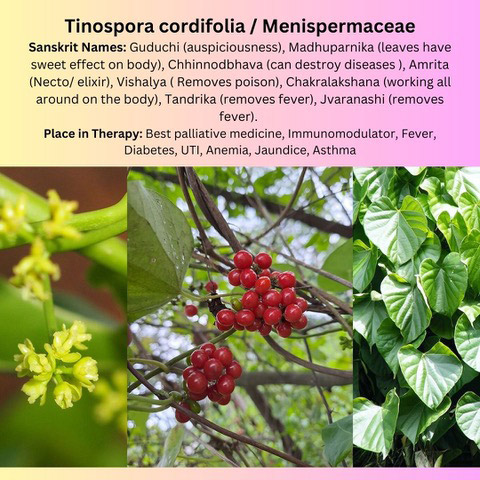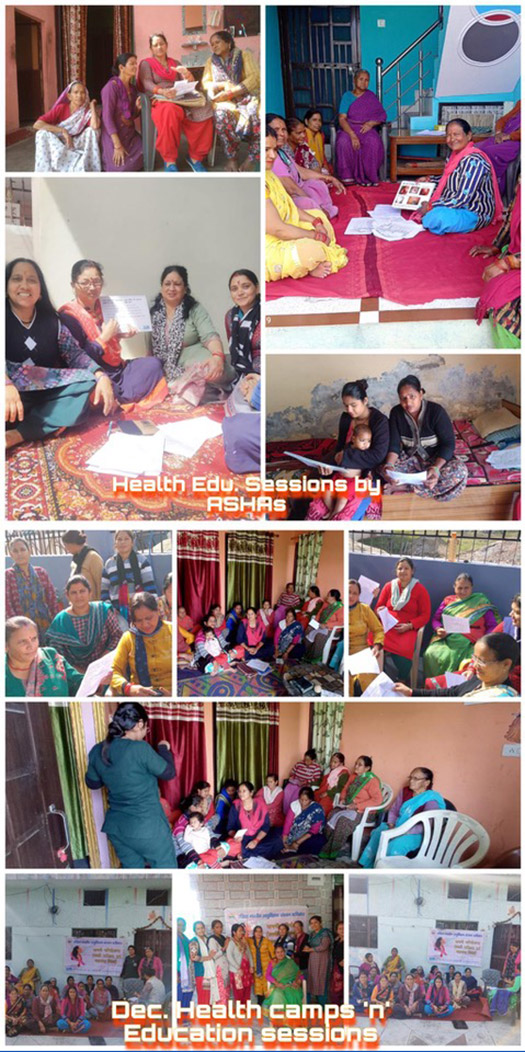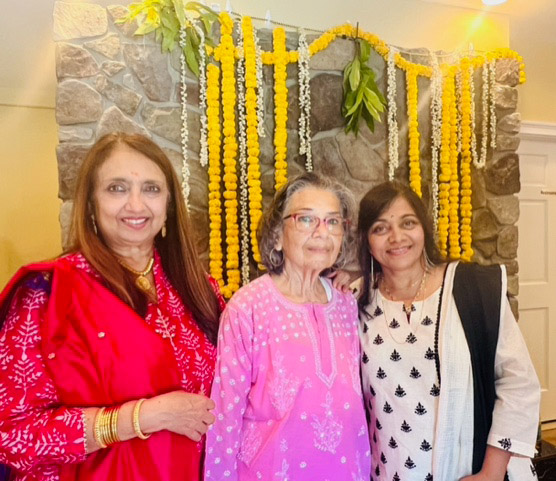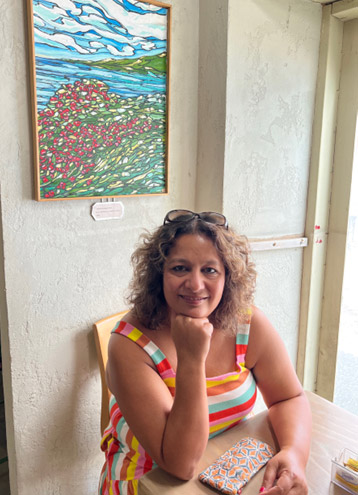
NEWSLETTER
July 2023

Welcome to the Maina Foundation Newsletter!
Ayurveda & Yoga in Health
By Manju Soni
Hi Friends,
I hope this newsletter finds you staying hydrated and enjoying summer and its bounty, although, if you’re not one for frizzy hair and a sweaty upper lip, then I hope the air-conditioned indoors is treating you well too.
This month I have a special treat for you, an interview many of you have asked me to do.
My good friend, Rachna Tewari, owner & founder of Swasthyam Wellness Center, and an ayurvedic diet and lifestyle coach, as well as an accomplished yoga teacher, has agreed to talk to me about her lifelong passion—Ayurveda and Yoga and their role in holistic health.
First, I have to fess up to something. As a doctor educated in Western medicine, I was initially skeptical about Ayurveda and its health advantages. But Rachna is an amazing teacher and has patiently convinced me of the enormous benefits of one of the world’s oldest holistic health systems.
Thank you, Rachna, for taking the time out of your schedule to shed some light on a topic that has become almost a buzzword with health enthusiasts worldwide.
What is Ayurveda then?
Thank you, Manju.
Ayurveda is a sister science of yoga. It is one of the oldest healing or medical systems on the planet. Ayurveda is built on the ethical foundation of four basic pursuits of one’s life: dharma (righteousness), artha (ethical earning), karma (meaningful desires) & moksha (spiritual liberation). To achieve these, one needs a good and healthy lifespan and a balance of body, mind and soul.
It is considered the upaveda of Atharva Veda (one among the 4 Vedas. Vedas are the oldest written documents explaining about science and society)
The word ‘Ayurveda’ is derived from two Sanskrit root words:
Translated as ‘the science of life’
Science of longevity/ life.
The system of Ayurveda originated thousands of years ago (~6000 BCE) in the Indian subcontinent, and initially, it was passed down through oral teachings, and later weaved into the scriptures.
Later, sages or clinicians as I call them, like Charaka, Sushruta, Vagbhatat and others, compiled this knowledge in treatises in their times. These texts are essential reading for aspirants of Ayurveda doctors to understand the true holistic, comprehensive and divine nature of this medical system.
Under colonization, Thomas Macaulay a British Raj official, filled with the zeal to introduce English ideas about government, education and morality to India, passed the English Education Act for India in 1835. The Act, amongst other things, championed English medical education and disparaged local practices, such as Ayurveda. But the practice saw a resurgence after Indian independence and is one of the few systems of medicine developed in ancient times that is still widely practiced today.
When did you take on this holistic lifestyle?
Growing up in India in our house, there was an emphasis on living in tune with the seasons, eating fresh home-cooked seasonal foods. We believed nature knows what is good for us, and that’s what nature produces. In case of any illness the first line of treatment /medicine was food and simple herbs. Later, if needed, we also approached the allopathic doctors and used modern medicine.
My grandfather was well versed in ancient scripture and my father, a long-term yoga practitioner, have been my biggest influence on this holistic path.
Frankly, I want to admit, as a teenager I always questioned the validity of these practices (which, I understand now being a student of Ayurveda). I moved to the USA after my marriage in 2001 and then started valuing my heritage and culture.
Ayurveda is for the body, and yoga is for the mind, and today we’ve moved away from the balance between our body, our mind, our spirit, and nature. My work in Ayurveda and yoga is all about restoring that balance.
What kind of training have you had?
My father has been an avid follower and practitioner of the famous Bihar School of Yoga. So, I think my informal training began at a younger age. We were surrounded by the Bihar School of Yoga books and monthly newsletters.
My first formal training was when my father enrolled me in a one-month yoga camp offered through the Bihar School of Yoga when I was in high school.
After moving to the US, I became more curious about my culture and heritage. I wondered why there was so much interest in a practice that’s so ancient, what did it offer us, and what was I missing, or taking for granted.
In 2010, I completed a 200-hour training through the Yoga Alliance and became a registered yoga teacher. Since then, I’ve done various courses, including Chair Yoga. And in India, I’ve completed two trainings offered through the Morarji Desai National Institute of Yoga, Delhi.
I began to formally study Ayurveda in 2015 with Ayurvedic doctors in India from Kerala and in 2017 I trained in New York, as an Ayurvedic health counselor.
Since 2019, I’ve been a candidate in a 4-year doctor of Ayurveda course at the Ayurveda Sadhana in Colorado. I’ll be graduating this year.
I am also doing weekly study of the classic Ayurvedic text Astanga hrdyum with Ayurvedic doctors from India and Sanskrit.
At the moment, I’m focusing more on Ayuryoga (Ayurveda Yoga), where I use my knowledge of Ayurveda to guide clients through yoga practices that are designed for their unique physiologies, characteristics and seasons.
Can you summarize for us what Ayurveda is?
At the core of it is the idea of BALANCE. Unlike medicine in the West, which often defines health as the absence of disease in the body, Ayurveda defines health as a state of balance between the mind, the body, the spirit, and society, all intricately balanced with nature. And health is the maintenance of this balance.
Ayurvedic definition of health: Perfect health is a balance of tridosha (Vata, Pitta & Kapha, the three biological functions), the digestive fire, the 7 tissues,
In Ayurveda, we believe everything organic & inorganic is made up of 5 essential elements: Ether, Air, Fire, Water & Earth.

In the human body, these 5 elements come together in various combinations to form 3 biological functions called Doshas (humors) — Vata (made up of Ether + Air, the movement principle, the nervous system of the body), Pitta (made up of Fire + Water, the transformation principle or the metabolism of the body) & Kapha (made of Water + Earth, Lubrication principle & the structure of the body). Each of us has all three doshas, but it’s the permutation and combination of the doshas that determines our unique constitution.
The literal meaning of the word Dosha is ‘impure’ something that vitiates or pollutes. A balanced state of doshas brings health & imbalance states brings disease. It is a like precaution/road sign as it is easy to get imbalanced.
Food is central in this, we are made up of food, and we become food when we die. It’s not only about what we eat, it’s about eating seasonally, and then also how we prepare the food, the aromas of it, the way we eat, socially or at our desk and rushed, the enjoyment of food, eating consciously and mindfully. Digestion begins before we even place food in our mouths, our mouths water and this is where the spices and aromas come in.
This is so interesting. In fact, scientific research today is making this same connection between the gut microbiome and inflammation, which is linked to so many diseases. How does Ayurveda help when things go wrong?
Our unique constitution is determined at conception and it doesn’t change throughout our lives. It’s called our “prakruti,” a natural combination of the doshas. We can see this everyday around us, we all know people of different temperaments, people who are cool or hot-headed.
When the doshas are imbalanced, we have “vikruti,” which happens throughout our lives due to various events in our environments, our habits and our stresses. When the imbalance of the doshas is not addressed, it sets the stage for the development of disease.
And how do we restore the balance?
First, we have to assess what exactly is out of balance. And then, depending on what we find, we may have to adjust our food intake, our lifestyle, add some herbs, and then also adjust the exercise we do.
One key principle in Ayurveda is “like increases like” and “opposites bring balance.” For example, a person with a lot of fire in them may be prone to hyperacidity, and also skin inflammation or eye issues. If this person consumes too much salty or pungent foods that will aggravate the imbalance. The treatment for that would be to go in the opposite direction.
Another example is people with a nervous system disorder, you want to give them more warming foods, and calming practices, such as restorative yoga, with a focus on breath and meditation. You would add black pepper, cumin, cardamom, fenugreek seeds, and mustard seeds to their diet. A sesame oil massage infused with herbs is very good for them.
In winter we would eat more grains, and oils, and ghee. In summer we would eat lighter foods, more vegetables, more fruit, easily digested.
Some people who are sluggish may need something more stimulating, so hot yoga would be energizing for them.
When you get a cold, we use things like honey which helps with breaking down mucus.
What is Ojas in Ayurveda?
In Ayurveda, the concept of ojas is very important. It’s our vigor, the radiance we emit. Our ojas influence everything related to our health—our immunity, our digestion, our physical strength, our spirituality, our sleep, our moods, our relationships.
Our ojas can be hugely influenced by our lifestyles, by rituals like the way we brush our teeth, or scrape our tongues, and by how we treat our bodies and our minds.
What about yoga?
In the West yoga has become yet another type of exercise, and asanas, that is poses, are the main concept taught. But they are only one element of yoga.
Patanjali, who is considered the father of yoga, codified 8 sutras in yoga, from external to the body to the internal. They include:
Yama (abstinences)
Niyama (observances)
Asana (yoga posture)
Pranayama (breath control)
Pratyahara (withdrawal of the senses)
Dharana (concentration of the mind)
Dhyana (meditation) and
Samadhi (absorption).
These sutras can be interpreted as a way of life that includes abstaining from harmful things, a social code of conduct such as non-violence, truth, honesty, being pure in a relationship, not being possessive. And then there’s a personal code of conduct, which includes contentment, self-study, austerity, staying in the company of wise people. The asanas are important to purify the body, as is the ability to focus and control our breathing. Pratyahara is a conscious withdrawal of energy from our senses, which has been shown to be helpful in the management of PTSD. During my classes I guide my students through aspects of yoga nidra, which is a powerful technique in the management of daily life and in illness.
It seems that most things about Ayurveda and yoga would be helpful in preventing and also assisting with the management of cancer, can you summarize these for us please?
Food: Maintaining a balanced diet, mainly plant-based and in season, is one of the core aspects of Ayurveda. Cancer-fighting foods like turmeric, ginger, garlic, and green leafy vegetables are essential to prevent cancer, and also help with recovery from chemo and cancer itself.
Stress: is one of the most harmful things that affects our bodies. Through the mindfulness of the Ayurveda way of living, of meditation, yoga, and breathing exercises, we can find our center and maintain a peaceful state of mind.
Herbs: Under proper guidance from someone familiar with these herbs and their uses, we can maximize their antioxidant properties and immune-boosting properties to provide a shield against cancer.
Detoxification: Again, under careful guidance, we can help our bodies eliminate toxins and purify our systems, and thus support our body’s natural defense mechanisms.
Any last words for our readers?
Ayurveda wisdom teaches us to listen to our bodies and find the balance in all aspects of our lives. We need to reach out from our inner selves, adjust our daily routine, get a good night’s sleep, and ensure we fulfil our responsibilities to ourselves, to family and community, to society, and above all to live in harmony with nature.
Only in this way can we live our lives to the fullest.
Where can you be reached if our readers would like to consult you?
Company: Swasthyam Wellness
Email: rachna@swasthyamwellness.com
Phone: 860- 514- 5062
Social Media:
Facebook: SWbyRachna (https://www.facebook.com/SWbyRachna )
Instagram: SWbyRachna (https://www.instagram.com/swbyrachna/)
Thank you, Rachna, for your valuable time and for this enlightening view into Ayurveda and yoga!
News!
In some exciting updates, over a period of 18 months, Maina Foundation’s collaboration with the All India Institute of Medical Science (AIIMS) held a total of 28 health camps and several health education sessions for breast cancer prevention in different outreach places of underserved areas in Raiwala, India.
568 women underwent clinical breast examination and i-breast examination and 1030 women of Raiwala were educated on the importance of breast care and breast cancer prevention. 42 women were referred for further assessment for breast cancer.
Congratulations to the staff of AIIMS

More (Fun) News!

Thank you for reading!
Manju Soni (she/her) (pen name: M. J. Soni) is a former eye surgeon turned author. She is the author of Defying Apartheid, her debut nonfiction book that captures her experiences of being a young activist against apartheid. Her short fiction and essays has appeared in Ellery Queen Mystery Magazine, Akashic Books, Apeiron Review and The Establishment. She’s a member of Crime Writers of Color and Sisters in Crime (National and Connecticut).
https://manjusoni.com | https://twitter.com/MJSoniWrites
We thank you for your continued support!
For more information on Maina Foundation, and to help its mission, go to https://mainafoundation.org or contact us at 860-434-3985 or info@mainafoundation.org
SAVE A LIFE - DONATE NOW
Donations can also be mailed to:
8 Peppermint Ridge, Old Lyme, CT 06371, USA

